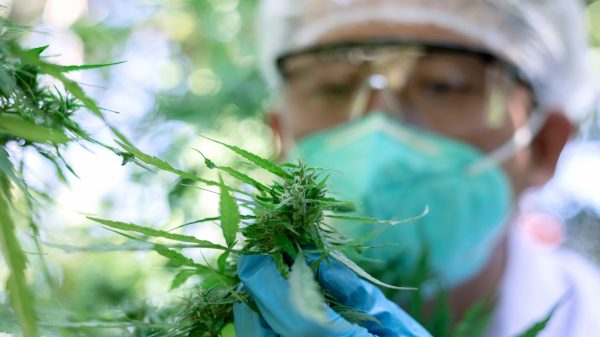Alex Medina is a senior cannabis insurance advisor for AlphaRoot, a company which provides insurance for cannabis retailers across the U.S. On Tuesday, APR spoke with Medina to hear his thoughts on the impacts of House Bill 445–the new law setting major restrictions on Alabama’s hemp and CBD industry–and how hemp businesses in Alabama will be forced to adapt moving forward.
First, APR asked Medina what hemp retailers in Alabama will need to do if they want to stay in business under the new restrictions.
“Honestly, retailers in Alabama are facing some tough times right now, but the ones who adapt quickly have the best shot at making it through. The key is immediately shifting inventory away from smokable products–which obviously HB445 bans–to things that are still allowed, like hemp beverages and edibles,” Medina said. “It’s also critical that they get serious about compliance, making sure their packaging, labeling, and THC testing are 100 percent in line with these new rules.”
Medina suggested that the retailers who are able to effectively adapt to the new rules and regulations put in place by HB445 might actually end up thriving as the law forces them to innovate.
“The retailers who move quickly and clearly communicate these changes to customers will not only survive, but probably stand out and build trust. As we’ve seen in America, when things get tough, that’s usually when businesses end up thriving and a bunch of other ones end up failing. So we’re going to end up seeing, obviously, a huge shift in what it is that’s happening in the Alabama market,” he stated.
On the other hand, Medina pointed out that accidental non-compliance with HB445’s rules could easily result in hemp retailers losing their businesses in Alabama.
“The biggest issue I see is accidental non-compliance. They can unintentionally violate the new rules, maybe selling a product that’s suddenly banned or packaging it incorrectly. Even minor mistakes can cost tens of thousands [of dollars] in fines and get the business shut down,” Medina said. “Another risk people usually overlook is [inadequate] insurance… A lot of retailers assume that insurance is going to cover them, but many policies will deny the claims if the business isn’t fully compliant. So my suggestion to Alabama retailers would be to double check with their insurers and do regular compliance audits to stay safe, specifically because hemp, as it matures, sometimes ends up going up in THC percentage. So it’s always recommended to periodically test the product even after it’s been packaged and on the shelf.”
As for the law’s ban on online direct-to-consumer sales, Medina sees it as another factor that will effectively shrink Alabama’s legal hemp industry, potentially leading consumers to seek out illegal alternatives.
“Honestly, the banning of the online direct-to-consumer sales is a big deal. It really limits sales convenience for customers and it shrinks the available market, making Alabama a much less attractive place for investors who prioritize growth and scale. So what we’re going to see a lot of is consumers looking toward the black market just for convenience and affordability, considering that they no longer have access to these products,” Medina noted.
Medina also said that he believes Alabama’s decision to restrict hemp products in the state is indicative of a larger trend in the South and across the United States.
“I’m the founder of the Puro company here in Los Angeles, which is also a cannabis brand, on top of being a senior advisor at AlphaRoot. Some of these changes we’re even seeing being implemented in California where there is a complete hemp ban. So this is definitely something that is trending on a much larger scale nation-wide, not just in the South, but I definitely see that a lot of states in the South are starting to tighten their regulations,” Medina said.
“I definitely think Alabama’s new rules are going to end up triggering other states as well to adopt similar restrictive measures,” he continued. “This is going to cause smaller operators to struggle, resulting in market consolidation. Some of the bigger players with the deeper pockets for compliance are most likely going to end up dominating, and hemp businesses throughout the South should brace for these changes and start adapting quickly because they’re going to find themselves in a heap of trouble… legally and financially, if they are not playing ball with the government.”
Medina added that he does not see many viable legal pathways for Alabama’s hemp industry to successfully fight back against these new restrictions in the meantime. Earlier this month, a Montgomery Circuit judge denied a request from four hemp companies who sought to temporarily halt HB445’s ban on smokable hemp products.
“No, not for the time being,” Medina responded when asked if he could foresee a scenario where the Alabama hemp industry is able to fight back against HB445’s new restrictions.
“Just because, on a federal level, it seems that the government isn’t as accepting of cannabis as they were in the last administration. In the last maybe six months there has been a lot of movement in the government that has been kind of pushing toward keeping everything federally illegal in terms of cannabis. So that’s partly the reason that we’re seeing a lot of these things take shape in the South in terms of the hemp industry,” he added.
Moving forward, Medina reemphasized the importance of adaptability and innovation for Alabama’s hemp retailers as they look to operate in the new regulatory landscape created by HB445.
“I think the path forward for Alabama’s hemp industry is going to be a tough one. Retailers are going to have to think strategically and creatively. They’re going to have to diversify their product lines within what is permitted… and they have to raise compliance rigorously if they want to stay in business. They’re really going to have to differentiate themselves, but when we see this type of pressure is when we end up seeing a lot of brands kind of rise from the ashes, if you will,” Medina stated.
“Look, regulations are changing overnight and they always hurt, but there is a real opportunity here too. The smartest hemp operators I know, they don’t just complain about the new rules, they adapt, they pivot, and they turn these tough times into a competitive advantage,” Medina added. “Alabama’s HB445 isn’t just a regulatory challenge, it’s a moment to test entrepreneurs’ creativity and their ability to evolve. The winners out of all of this are going to be the ones who act quickly, the ones that are transparent and genuinely embrace the compliance as part of doing business.”





















































